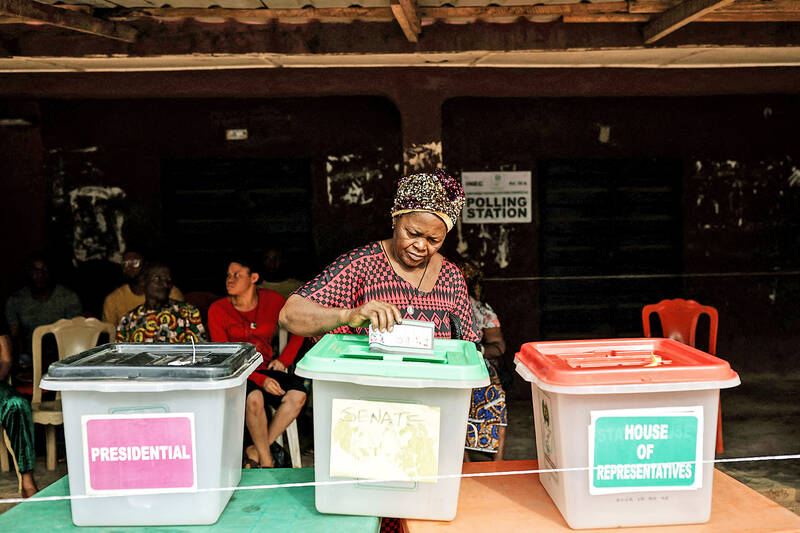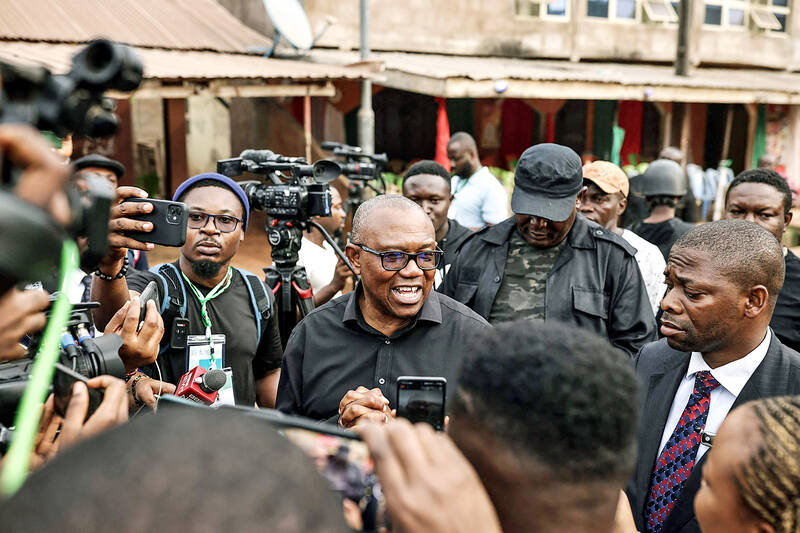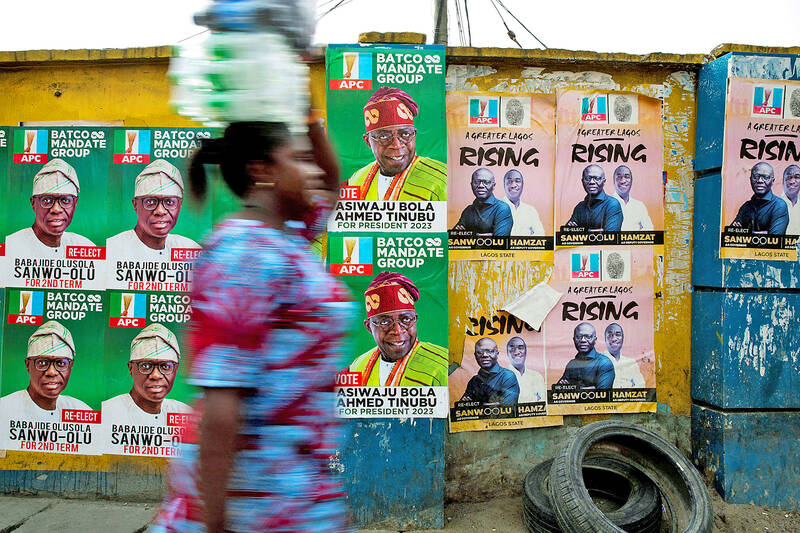Nigerians voted yesterday for a successor to Nigerian President Muhammadu Buhari in a tightly fought race dominated by three political veterans.
Nearly 90 million people were eligible to vote in the poll, which unfolded as Africa’s most populous democracy grapples with a security crisis, a sluggish economy and widening poverty.
For the first time in Nigeria’s modern history, a third candidate has emerged to challenge the ruling All Progressives Congress (APC) party and the main opposition Peoples Democratic Party (PDP).

Photo: AFP
“It’s going to be different this time, we have three people,” said Friday Ikwuako, 55, a school employee waiting to vote in Lagos’ affluent Ikoyi District. “We want a change in government.”
Polling stations were meant to open at 7:30am, but election officials had still not arrived or voting machines were not in place at numerous polling stations visited by Agence-France Presse in Lagos and in southern Port Harcourt and northwestern Kano.
With Buhari stepping down after two terms in office, APC presidential candidate Bola Tinubu, 70, a former Lagos governor and political kingmaker, said: “It’s my turn” for the presidency.

Photo: AFP
He faced a familiar rival — PDP candidate and former Nigerian vice president Atiku Abubakar, 76, who is on his sixth bid for the top job.
However, the emergence of a surprise third candidate appealing to young voters, the Labour Party’s Peter Obi, 61, threw the race open with his appeal for change from his old-guard rivals.
Nearly 10 million new voters registered this year, most of them younger than 34, representing an essential bloc if they came out to vote.

Photo: Reuters
“It’s a very important election because we need a total change,” 61-year-old fashion designer Titus Ojewale said as he waited to vote in Lagos’ Yaba District. “We need a leader that will be able to help our youth to show their creativity, to make the economy move forward.”
Cash and fuel shortages in the days before the election have left many Nigerians angry and struggling more than usual in a country already hit by more than 20 percent inflation.
Voters also cast their ballot for Nigeria’s two houses of parliament, the National Assembly and Senate.
The Nigerian Independent National Electoral Commission has given no timeline for results, but votes are expected to be tallied within a few days.
Under a law implemented last year, the official results have to be confirmed within 14 days.
To win the presidency, a candidate must get the most votes, but also win 25 percent in two-thirds of Nigeria’s 36 states.
If no candidate wins, a runoff would take place within 21 days between the two front-runners, an unprecedented outcome that some analysts say is a possibility this time around.
“It’s difficult for us to make an easy prediction as to what is going to be the likely outcome,” Kano State College public affairs lecturer Kabiru Sufi said.
The rules reflect a country almost equally split between the mostly Muslim north and predominantly Christian south, and with three main ethnic groups across the regions: Yoruba in the southwest, Hausa/Fulani in the north and Igbo in the southeast.
Presidential elections have in the past often been marked by violence, ethnic tensions, vote-buying and clashes between supporters of rival parties.
Voting also often falls along ethnic and religious lines. This time, Tinubu is a southern Yoruba Muslim, Atiku is an ethnic Fulani Muslim from the northeast, and Obi is a Christian Igbo from the southeast.
In 2019, hours before polls opened, the election commission postponed the vote by a week because of problems delivering election materials.
Today, most experts see the commission as being more prepared.
It has introduced biometric voter IDs to help prevent fraud, and results were to be transmitted electronically.
About 400,000 police and troops were to be deployed around the country to protect the vote.
However, security challenges were vast.
Militants operate mostly in the northeast, bandit militias control rural communities in the northwest, and separatist assailants have targeted election commission offices and police in the southeast.

The Philippines yesterday said its coast guard would acquire 40 fast patrol craft from France, with plans to deploy some of them in disputed areas of the South China Sea. The deal is the “largest so far single purchase” in Manila’s ongoing effort to modernize its coast guard, with deliveries set to start in four years, Philippine Coast Guard Commandant Admiral Ronnie Gil Gavan told a news conference. He declined to provide specifications for the vessels, which Manila said would cost 25.8 billion pesos (US$440 million), to be funded by development aid from the French government. He said some of the vessels would

CARGO PLANE VECTOR: Officials said they believe that attacks involving incendiary devices on planes was the work of Russia’s military intelligence agency the GRU Western security officials suspect Russian intelligence was behind a plot to put incendiary devices in packages on cargo planes headed to North America, including one that caught fire at a courier hub in Germany and another that ignited in a warehouse in England. Poland last month said that it had arrested four people suspected to be linked to a foreign intelligence operation that carried out sabotage and was searching for two others. Lithuania’s prosecutor general Nida Grunskiene on Tuesday said that there were an unspecified number of people detained in several countries, offering no elaboration. The events come as Western officials say

Hundreds of thousands of Guyana citizens living at home and abroad would receive a payout of about US$478 each after the country announced it was distributing its “mind-boggling” oil wealth. The grant of 100,000 Guyanese dollars would be available to any citizen of the South American country aged 18 and older with a valid passport or identification card. Guyanese citizens who normally live abroad would be eligible, but must be in Guyana to collect the payment. The payout was originally planned as a 200,000 Guyanese dollar grant for each household in the country, but was reframed after concerns that some citizens, including

A plane bringing Israeli soccer supporters home from Amsterdam landed at Israel’s Ben Gurion airport on Friday after a night of violence that Israeli and Dutch officials condemned as “anti-Semitic.” Dutch police said 62 arrests were made in connection with the violence, which erupted after a UEFA Europa League soccer tie between Amsterdam club Ajax and Maccabi Tel Aviv. Israeli flag carrier El Al said it was sending six planes to the Netherlands to bring the fans home, after the first flight carrying evacuees landed on Friday afternoon, the Israeli Airports Authority said. Israeli Prime Minister Benjamin Netanyahu also ordered